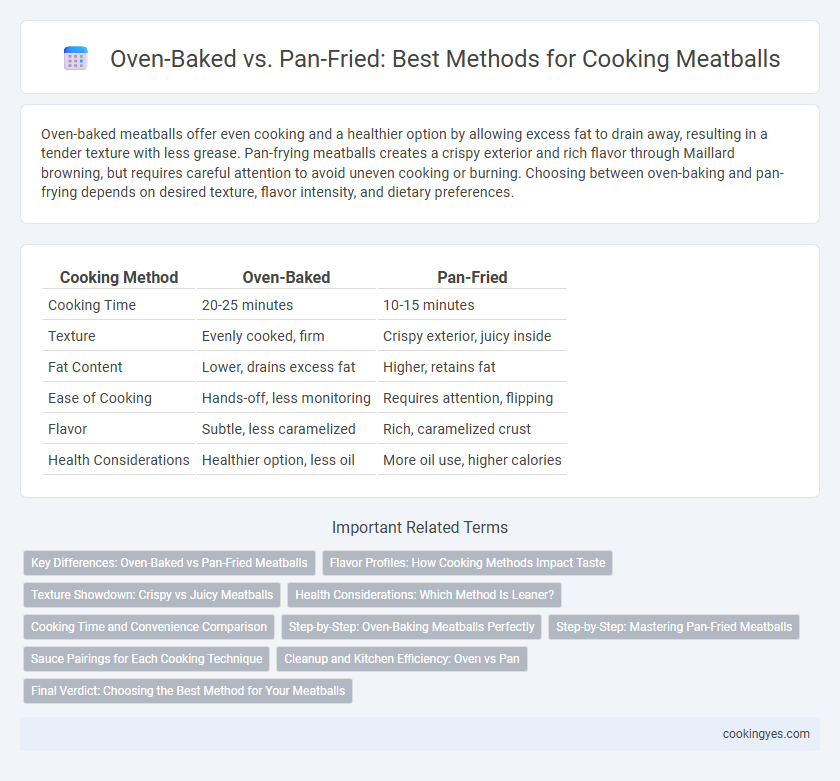Oven-baked meatballs offer even cooking and a healthier option by allowing excess fat to drain away, resulting in a tender texture with less grease. Pan-frying meatballs creates a crispy exterior and rich flavor through Maillard browning, but requires careful attention to avoid uneven cooking or burning. Choosing between oven-baking and pan-frying depends on desired texture, flavor intensity, and dietary preferences.
Table of Comparison
| Cooking Method | Oven-Baked | Pan-Fried |
|---|---|---|
| Cooking Time | 20-25 minutes | 10-15 minutes |
| Texture | Evenly cooked, firm | Crispy exterior, juicy inside |
| Fat Content | Lower, drains excess fat | Higher, retains fat |
| Ease of Cooking | Hands-off, less monitoring | Requires attention, flipping |
| Flavor | Subtle, less caramelized | Rich, caramelized crust |
| Health Considerations | Healthier option, less oil | More oil use, higher calories |
Key Differences: Oven-Baked vs Pan-Fried Meatballs
Oven-baked meatballs offer even cooking and reduced fat content as excess grease drains away during baking, resulting in a lighter texture and consistent flavor. Pan-fried meatballs develop a crispy, golden-brown crust through direct contact with hot oil, enhancing caramelization and adding a richer, more intense taste. Temperature control and cooking time vary significantly; oven baking requires lower heat for longer periods, while pan-frying relies on higher heat and quicker cooking to preserve juiciness inside.
Flavor Profiles: How Cooking Methods Impact Taste
Oven-baked meatballs offer a more evenly cooked interior with a tender, juicy texture, allowing spices and herbs to meld subtly without excessive browning. Pan-fried meatballs develop a rich, caramelized crust that intensifies savory and umami flavors through Maillard reactions, creating a crispy exterior contrast. The choice between methods ultimately shapes the flavor complexity, with oven baking emphasizing moistness and pan-frying enhancing robust, toasted notes.
Texture Showdown: Crispy vs Juicy Meatballs
Oven-baked meatballs deliver a consistent, tender interior with a slightly crispy exterior due to even heat distribution, perfect for juicy texture retention. Pan-fried meatballs develop a rich, golden-brown crust that enhances crispiness while potentially sacrificing some internal moisture. Choosing between these methods hinges on whether a crispy crust or a uniformly juicy bite is prioritized in meatball preparation.
Health Considerations: Which Method Is Leaner?
Oven-baked meatballs are generally leaner than pan-fried ones because baking allows excess fat to drain away during cooking, reducing overall grease content. Pan-frying typically involves cooking meatballs in oil, which can increase calorie and fat levels due to absorption. Choosing oven-baked meatballs can help maintain a healthier fat profile while preserving flavor and texture.
Cooking Time and Convenience Comparison
Oven-baked meatballs typically require 20-25 minutes at 400degF, offering hands-off cooking and even heat distribution, making them convenient for batch preparation. Pan-fried meatballs cook faster, around 10-12 minutes, providing a crispy exterior but demand constant attention to prevent burning. Choosing between the two methods depends on balancing desired texture, cooking time, and ease of preparation.
Step-by-Step: Oven-Baking Meatballs Perfectly
Preheat your oven to 400degF (200degC) and line a baking sheet with parchment paper or aluminum foil to prevent sticking and ensure even cooking. Shape your meat mixture into uniform balls, place them on the sheet with some space between each, and bake for 18-20 minutes until golden brown and cooked through. Use a meat thermometer to check that the internal temperature reaches 165degF (74degC) for perfectly baked, juicy meatballs every time.
Step-by-Step: Mastering Pan-Fried Meatballs
Pan-fried meatballs begin by shaping evenly sized portions, then heating oil in a skillet over medium heat to ensure a crispy exterior. Carefully place the meatballs in the pan, cooking them for 4-5 minutes on each side until golden brown and cooked through. This method locks in moisture and flavor, creating a perfect balance of crispy outside and tender inside.
Sauce Pairings for Each Cooking Technique
Oven-baked meatballs develop a tender texture that pairs exceptionally well with rich tomato-based sauces like marinara or a hearty bolognese, enhancing their moistness without overpowering the flavor. Pan-fried meatballs achieve a crispy exterior ideal for thicker, creamier sauces such as mushroom gravy or a robust Swedish meatball sauce, which complement the caramelized crust. Choosing the appropriate sauce based on the cooking technique elevates the overall taste experience by balancing texture and richness.
Cleanup and Kitchen Efficiency: Oven vs Pan
Oven-baked meatballs significantly reduce cleanup time as they cook on a single baking sheet, preventing grease splatters common with pan-frying. The oven method allows simultaneous cooking of large batches, enhancing kitchen efficiency and freeing stovetop space for other tasks. Pan-frying requires frequent skillet washing and careful management of oil splatter, increasing overall mess and cleanup effort.
Final Verdict: Choosing the Best Method for Your Meatballs
Oven-baked meatballs offer even cooking, reduced fat content, and consistent texture, making them ideal for health-conscious cooks seeking convenience. Pan-fried meatballs provide a crispy exterior and rich caramelization, enhancing flavor and visual appeal, perfect for those prioritizing taste and traditional preparation. Selecting the best method depends on desired texture, health considerations, and cooking time, with oven-baking favored for uniformity and pan-frying preferred for robust flavor.
Oven-Baked vs Pan-Fried for Meatball Cooking Infographic

 cookingyes.com
cookingyes.com